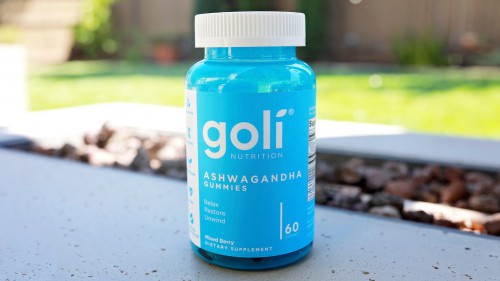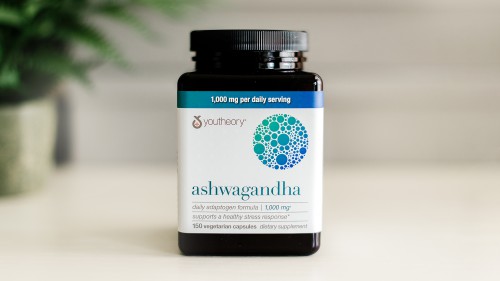Roman Focus Review: Is It Safe and Effective?
Published on October 21, 2021
Medically Reviewed by Anthony Dugarte, MD
Roman Focus is a nootropic marketed for men who want to have calm energy, improved mental acuity, and better concentration. This supplement has ingredients that are well-researched and in amounts that matter, all within an affordable price range.


|
Pros
|
Cons
|
What Is Roman Focus?
Roman Focus is a nootropic supplement to support calm energy, mental acuity, and concentration.
Nootropics are a group of natural, synthetic, or prescription substances that support brain performance.
The main ingredients in Roman Focus are L-theanine, caffeine, American ginseng, Bacopa monnieri, vitamin B6, niacin, and alpha-glycerylphosphorylcholine (Alpha-GPC).
The Roman brand comes from Ro, a healthcare technology company with an emphasis on telehealth.
Roman is focused on men’s health and uses telehealth to personalize recommendations for mostly prescription medications to support sexual health, hair and skin, mental health, and general health.
Roman Focus is one of the few products available through the brand without needing a prescription or online visit with a healthcare provider because it is a supplement.
To use Roman Focus, you can take this supplement daily, either with or without food. The recommended dosage is two capsules per day, and you should not exceed this limit.
According to the company, you can experience the benefits of calm energy, alertness, and focus from L-theanine, caffeine, and American ginseng within 30–60 minutes after use.
Other benefits from taking Roman Focus may require continuous use for several weeks before they are noticeable.
Evaluation of Ingredients
Niacin (as Niacinamide), 20 mg
Niacin is an essential water-soluble vitamin found in many foods, including animal and plant protein foods, fortified cereals, rice, and mushrooms.
Niacin is necessary for energy production in the brain, DNA repair, antioxidant protection, and modulating the immune response in the brain. (1)
Deficiencies of niacin may lead to symptoms of depression and memory loss, which are resolved with niacin intake or supplementation.
A 2019 review on the roles and impact of niacin on the brain suggests that niacin supplementation may improve outcomes in people with neurodegenerative conditions. (2)
In conditions such as Alzheimer’s disease, Parkinson’s, and Huntington’s, levels of niacin tend to be low.
In the reviewed studies, researchers found that niacin supplementation can help brain cell revival, reduce inflammation and degeneration of brain cells, and regulate proper metabolism in the brain.
Summary
Niacin is a water-soluble supplement that has research supporting its effectiveness against the degeneration of nerve cells in the brain in many chronic conditions.
Vitamin B6 (as Pyridoxal-5-Phosphate), 1.3 mg
Pyridoxal-5-phosphate is the active form of vitamin B6, an essential water-soluble vitamin found in protein foods, fortified cereals, starchy vegetables, and bananas.
Vitamin B6 is necessary for producing hormones important for mood and motivation, such as GABA, serotonin, and dopamine.
A deficiency of vitamin B6 may result in decreased alertness, increased irritability, depression, cognitive decline, and even anemia. (1)
A 2020 review on the effects of vitamins and minerals on fatigue, cognition, and psychological function found that supplements containing vitamin B6 and other micronutrients may reduce stress, decrease anxiety and risk of depression, improve recovery from fatigue, and preserve cognitive function in individuals with low intake of B vitamins. (3)
Summary
Vitamin B6 in Roman Focus is necessary for hormone and neurotransmitter production, and supplementation with vitamin B6 may help cognition, mood, and energy levels.
Bacopa Monnieri (Aerial Parts) Extract, 300 mg
Bacopa monnieri is an Ayurvedic herb that is traditionally thought to sharpen the mind and intellect and has anti-inflammatory properties to support brain health.
A cell study published in 2017 found that extracts of Bacopa monnieri could reduce the production of inflammatory molecules in brain immune cells and reduce the activation of enzymes associated with Alzheimer’s disease. (4)
In a 2019 review of the neuroprotective effects of Bacopa monnieri, clinical studies show improved cognitive performance from taking Bacopa extract, with benefits including speed of visual information processing, retention of new information, improved memory and recall, and improved mood. (5)
Most studies used 300 mg of Bacopa monnieri extract and a supplementation duration of 12 weeks or longer to see benefits.
Summary
Roman Focus contains clinically studied doses of Bacopa monnieri, which in most clinical studies is found to provide several brain function benefits when taken consistently for approximately 12 weeks.
American Ginseng Root Extract, 200 mg
American ginseng is a variety of the ginseng plant found in North America and used in herbal medicine.
This variety of ginseng may help neurocognitive function through protecting nerve cells and improving acetylcholine synthesis, as shown by animal studies. (6)
A 2010 clinical study on a standardized American ginseng extract (Cereboost) found that supplementation with 200 mg of extract improved word recall accuracy and numeric working memory speed compared to a placebo or doses of Cereboost at 100 mg or 400 mg. (7)
A recent 2020 clinical study found that participants taking 200 mg of American ginseng extract had increased brain activity during working memory tasks compared to a placebo. (8)
Summary
The American ginseng present in Roman Focus is in a clinically studied dose found to improve recall and working memory by protecting nerve cells and increasing acetylcholine in the brain.
L-theanine, 200 mg
L-theanine is an amino acid primarily found in the leaves of Camellia sinensis, or the tea plant. Its structure is similar to glutamate, an amino acid precursor to GABA, the body’s main calming neurotransmitter.
Supplementing with L-theanine can reduce stress response and feelings of anxiety in some adults and is linked to increased alpha-wave activity in the brain, which is seen during states of relaxation. (9, 10)
A 2015 review found that, when taken alone or combined with caffeine, L-theanine can improve attention and decrease mind-wandering. (11)
Summary
The L-glutamine in Roman Focus reduces stress and anxiety and can help improve facets of mental functioning, including when combined with caffeine.
AlphaSize Alpha-Glycerylphosphorylcholine, 196 mg
Alpha-GPC is a semi-synthetic derivative of phosphatidylcholine, a fatty acid-based molecule part of cell membranes, and is a precursor to acetylcholine (an excitatory brain hormone).
Acetylcholine is needed for brain processes, including learning, memory, brain plasticity, and executive function. (12)
A 2013 review suggested that in clinical studies, alpha-GPC improved memory, attention, and symptoms from dementia disorders. (13)
In one clinical trial published in 2017, Alpha-GPC combined with donepezil (a medication used to treat Alzheimer’s disease) was found to improve behavioral and psychological symptoms of people experiencing mild to moderate Alzheimer’s to a greater degree than donepezil with placebo. (14)
Summary
Alpha-GPC, a semi-synthetic precursor to acetylcholine, may be an effective ingredient to help cognition and decrease behavioral and psychological symptoms found in people with dementia-related diseases.
Caffeine (from Green Tea Leaf), 100 mg
Caffeine is a commonly consumed stimulant found in foods and beverages, including chocolate, coffee, and tea.
It is widely studied for its benefits on mood, energy, and cognition. (15)
Studies support caffeine to increase dopamine, improve alertness, activate memory and learning processes in the brain and reduce fatigue.
In a 2020 review on the behavioral effects of caffeine, studies suggest that low to moderate caffeine intake may decrease the risk of depression, improve symptoms of ADHD, attenuate cognitive failure, and improve performance in memory and attention-based tasks. (16)
Summary
Low to moderate doses of caffeine as found in Roman Focus can help mood, concentration, and cognitive function, and may reduce cognitive failure.
Support for Claimed Benefits
Below is our summary of the available evidence for the claimed benefits of Roman Focus based on the available research:
| Calm energy | 5/5 |
| Concentration | 5/5 |
| Memory and recall | 4/5 |
| Cognitive performance | 5/5 |
Roman Focus contains ingredients that have clinical studies behind them to support their benefits for brain health.
Most ingredients had reviews available concerning their benefits, and the research was consistent in these reviews.
I would like to see more research on American ginseng and its benefits for brain health since many available studies are only on animals.
Overall, the ingredients in Roman Focus are shown to help with brain health, calm energy, concentration, memory and recall, and cognitive performance.
Side Effects, Safety, and Dosing
Roman Focus can be taken daily, either with or without food. The recommended dosage is two capsules per day, and you should not exceed this limit.
Taking more than the recommended two capsules may increase the likelihood of side effects from using this product.
Roman Focus contains caffeine, so this should be considered with any other caffeine-containing food or beverage you may have during the day.
The FDA warns against excessive amounts of caffeine and recommends limiting caffeine intake up to 400 mg daily from all sources (which equals approximately 3 or 4 cups of coffee). (17)
Side effects from ingesting caffeine may include increased heart rate, insomnia, dizziness and lightheadedness, headache, diarrhea, feelings of anxiety or agitation, or upset stomach. (18)
Rapidly consuming 1000 mg or more of caffeine has been associated with seizures and even death. (18)
To avoid potential sleep disturbances from taking caffeine, avoid taking Roman Focus too late in the day (at minimum 4–6 hours before bedtime).
Side effects from taking Bacopa monnieri may include abdominal cramps, nausea, and increased bowel movements. (19)
L-theanine supplements in clinical trials are generally not seen to cause side effects, but obtaining L-theanine from large intakes of tea may result in gastrointestinal symptoms and potential hepatotoxicity. (20)
American ginseng may cause symptoms, including insomnia, anxiety, nausea, gas, burping, rash, abdominal pain, and flu-like syndrome. (21)
Roman Focus is free of major allergens and is vegetarian and vegan-friendly.
I was not able to find any information on their website about whether Roman Focus was third-party certified or not, or if there was any third-party testing.
Before starting Roman Focus, speak with your doctor to see if adding this supplement is appropriate for your current routine.
Cost
A one-month supply of Roman Focus is $48 for a single bottle. Customers can also purchase Roman Focus in a 3-month supply for $120 (a savings of $24).
On your first order, Roman Focus is only available as a subscription service. Only after you’ve received your first order can you switch to an “on-demand” shipment for your supplement.
This could pose a problem for people who want to try the program but forget to cancel their subscription, resulting in a bill for the following month.
Roman tries to reduce this from occurring by sending email reminders 24 hours before processing a refill so that you can adjust your plan.
Your plan can also be modified or canceled at any time online.
Roman does not allow returns of subscription products, and all sales are final.
When I called their customer support, I was told they might offer a courtesy refund if you experienced side effects or feel that the product is not working for you.
However, this may depend on your individual situation and you should call their support line to see if you qualify for a refund.
Top-selling nootropic and brain supplements cost between $20–$80 depending on the brand, so by comparison, I believe that Roman Focus is well-priced considering the quality and dosing of its ingredients.
Summary
Roman Focus is a moderate-cost nootropic supplement worth its cost due to its inclusion of well-studied ingredients in clinically relevant doses.
However, it lacks in its return policy, and its auto-subscription model may cause issues for people who only wanted to test Roman Focus for one month.
How Roman Focus Compares to Alternatives
Brain health and nootropic supplements are very popular these days, but not all are of the same quality.
Roman Focus is a supplement that only includes ingredients that have been clinically tested and actually has ingredients in the optimal clinical doses in which results were seen.
Some formulas either don’t have enough of certain ingredients or think that “more is better” when that’s not always the case.
If you do want some alternatives, there are some out there.
For example, Mind Lab Pro can be an excellent alternative to Roman Focus.
It has multiple third-party certifications, is free of caffeine, has a clear 90-day return policy, and many of its ingredients are in a standardized form to ensure quality.
It does suffer from not having clinical doses of all ingredients, and it has to be cycled (taking an occasional break from the supplement), but it still has many benefits.
Neuro Gum and Mints are great on-the-go nootropics that are quick-acting and have options to focus on only energy and focus or calming your mood.
They may not contain optimal doses of ingredients, and not all ingredients have wide bodies of research, but they could be nice for a quick boost.
Individuals who prefer taking fewer ingredients in a brain health supplement can look at supplements containing ashwagandha, DHA, or other top brain health ingredients.
Summary
Roman Focus has the edge over many brain health supplements by having well-studied ingredients and in proper doses. However, some alternative products may be better due to not containing caffeine, having clear return policies, and using more standardized ingredients.
The Bottom Line
Overall, Roman Focus is one of the better-formulated nootropic supplements that I have evaluated recently.
It contains only studied ingredients, the ingredients are in the correct doses, and it’s in an easy-to-take serving size.
Roman Focus is for men looking for a nootropic supplement to support their cognitive health without extra frills.
This product is not suitable for someone looking for a caffeine-free nootropic to help their brain function, and they may be better suited for a caffeine-free product to meet their needs.
Before taking Roman Focus or any other nootropic, take time to speak with your doctor to make sure that taking this supplement is safe and proper for you.
A Word from Our Dietitian
A nootropic supplement such as Roman Focus may help with cognitive function, but the best results can come from a lifestyle focused on optimizing your health.
First, eating a diet full of foods that provide healthy fats, vitamins and minerals, fiber, and other antioxidants can help reduce inflammation and provide the nutrients you need to slow cognitive decline.
For a full eating pattern, try the Mediterranean-DASH Intervention for Neurodegenerative Delay diet, also known as the MIND diet.
It has been attributed to better cognition and decreased risk for Alzheimer’s onset and progression.
A regular exercise routine maintains blood flow for your brain and helps strengthen neural activity to improve learning, memory, and brain cell growth. (22)
Your body and brain repair themselves while you’re sleeping, so it’s important to prioritize rest.
The National Sleep Foundation recommends that adults get between 7 to 9 hours of sleep per night for their health.
If you’re concerned about your cognition and feel that you may not be as sharp as you used to, speak with your doctor.
They can discuss your brain health with you and help you get further testing if your cognitive functioning isn’t optimal for your age.
At WellnessVerge, we only use reputable sources, including peer-reviewed medical journals and well-respected academic institutions.
- B Vitamins and the Brain: Mechanisms, Dose and Efficacy—A Review:
https://www.ncbi.nlm.nih.gov/pmc/articles/PMC4772032/ - Niacin in the Central Nervous System: An Update of Biological Aspects and Clinical Applications:
https://www.ncbi.nlm.nih.gov/pmc/articles/PMC6412771/ - Vitamins and Minerals for Energy, Fatigue and Cognition: A Narrative Review of the Biochemical and Clinical Evidence:
https://www.ncbi.nlm.nih.gov/pmc/articles/PMC7019700/ - The Ayurvedic plant Bacopa monnieri inhibits inflammatory pathways in the brain:
https://pubmed.ncbi.nlm.nih.gov/27473605/ - Bacopa monnieri, a Neuroprotective Lead in Alzheimer Disease: A Review on Its Properties, Mechanisms of Action, and Preclinical and Clinical Studies:
https://www.ncbi.nlm.nih.gov/pmc/articles/PMC6669844/ - Cereboost™, an American ginseng extract, improves cognitive function via up-regulation of choline acetyltransferase expression and neuroprotection:
https://pubmed.ncbi.nlm.nih.gov/27112419/ - Effects of American ginseng (Panax quinquefolius) on neurocognitive function: an acute, randomised, double-blind, placebo-controlled, crossover study:
https://www.ncbi.nlm.nih.gov/pmc/articles/PMC2952762/ - Effects of Panax quinquefolius (American ginseng) on the steady state visually evoked potential during cognitive performance:
https://www.ncbi.nlm.nih.gov/pmc/articles/PMC7685123/ - Anti-Stress, Behavioural and Magnetoencephalography Effects of an L-Theanine-Based Nutrient Drink: A Randomised, Double-Blind, Placebo-Controlled, Crossover Trial:
https://pubmed.ncbi.nlm.nih.gov/26797633/ - L-theanine, a natural constituent in tea, and its effect on mental state:
https://pubmed.ncbi.nlm.nih.gov/18296328/ - Acute effects of tea constituents L-theanine, caffeine, and epigallocatechin gallate on cognitive function and mood: a systematic review and meta-analysis:
https://pubmed.ncbi.nlm.nih.gov/24946991/ - The neural and genetic basis of executive function: attention, cognitive flexibility, and response inhibition:
https://pubmed.ncbi.nlm.nih.gov/23978501/ - Choline alphoscerate (alpha-glyceryl-phosphoryl-choline) an old choline- containing phospholipid with a still interesting profile as cognition enhancing agent:
https://pubmed.ncbi.nlm.nih.gov/24156263/ - The Effect of the Association between Donepezil and Choline Alphoscerate on Behavioral Disturbances in Alzheimer's Disease: Interim Results of the ASCOMALVA Trial:
https://pubmed.ncbi.nlm.nih.gov/28035924/ - Caffeine and the central nervous system: mechanisms of action, biochemical, metabolic and psychostimulant effects:
https://pubmed.ncbi.nlm.nih.gov/1356551/ - Caffeine induces neurobehavioral effects through modulating neurotransmitters:
https://www.ncbi.nlm.nih.gov/pmc/articles/PMC7132598/ - Spilling the Beans: How Much Caffeine is Too Much?:
https://www.fda.gov/consumers/consumer-updates/spilling-beans-how-much-caffeine-too-much - The clinical toxicology of caffeine: A review and case study:
https://www.ncbi.nlm.nih.gov/pmc/articles/PMC6247400/ - Does Bacopa monnieri improve memory performance in older persons? Results of a randomized, placebo-controlled, double-blind trial:
https://pubmed.ncbi.nlm.nih.gov/20590480/ - Toxicological effects of Camellia sinensis (green tea): A review:
https://onlinelibrary.wiley.com/doi/abs/10.1002/ptr.6063 - Ginseng as a Treatment for Fatigue: A Systematic Review:
https://pubmed.ncbi.nlm.nih.gov/29624410/ - Exercise builds brain health: key roles of growth factor cascades and inflammation:
https://pubmed.ncbi.nlm.nih.gov/17765329/






